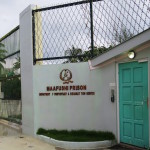“Immunity for gangsters is basically an obvious thing…After that news conference these gangs got immunity from being prosecuted. But are they loyal to the ministers who did that? No they are not.â€
At a time of political uncertainty in the run-up to the country’s first multi-party presidential elections, as parties vie for influence , there is increasing concern that street violence – so often intertwined with politics in the past – will flare up again.
Speaking on condition of anonymity, a senior member of the government speaks openly about soaring crime levels, failures in the system, and how the relationship between politicians and gangs is only likely to worsen over the election period.
We are seeing a significant increase in recorded crime in Maldives, especially in Malé. What are the main reasons for the high levels of crime?
If you look at the structure of the population pyramid, there is a disproportionately larger number of young people. Some people call this a youth bulge. That’s part of the problem – it is an underlying cause.
Unfortunately, we as a society have not been very successful at bringing up our children as useful young adults. The whole system has not been working well. I think about 80 per cent of the children drop out of school; if they don’t drop out then they graduate with hardly any grades that will give them opportunities to a good job or education institution. So 80 per cent of the children end their school careers as failures.
Even out of the remaining 20 per cent, half of them also don’t get the opportunities they need even if they have the grades. So it is only about 10 per cent of the youth that really become something.
Overcrowding is also an issue. When they were divided on the islands they didn’t form street gangs. Gangs are an urban phenomenon. Around twenty years ago Malé only held 15 per cent of the population, but now it holds about a third of the overall population.
What is the answer? Criminalisation or a different approach?
It needs a combined approach. Criminalisation is only part of a spectrum of action that needs to be taken. There needs to be a range of activities starting from at home, school and the community level – and finally at the level of the police and the juvenile justice system.
All children are born innocent. The problem we have involves a failure of parents to teach the baby how to become a good child, because of a lack of parenting skills among young parents.
Later on, the school is the place the child learns these antisocial activities so once early symptoms show themselves, teachers should identify and remedy them. Once a child doesn’t do well in school, they get into minor difficulties with the teachers, and somehow it alienates them and they end up going out on the streets, smoking and then drugs – this is the usual route.
So the children that are likely to do this, if they can be identified, they could get counselling or alternative classes.
There are counsellors in schools at the moment, aren’t there?
There are counsellors, but it doesn’t seem to work very well because of a lack of cohesive programmes. The school doesn’t have a system to absorb them. The principal and the supervisors hardly have an idea what counselling is or what the counsellors should be doing.
So this counselling system – even though there are counsellors, it hasn’t really worked.
So ultimately, by the time they are 15 or 16 years of age, these children invariably get into criminal activities, like serious crimes – armed robbery and these things.
If all the preventative measures were there, very few children would end up like this. But unfortunately at the present time, a very large number of children end up as serious criminals.
Once a person has committed a serious crime it has to be criminalised and punished according to the age of the child. It cannot be condoned.
These children are sensitive to these deterrents. A lot of would-be criminals who are making nuisances of themselves – at that stage, a single warning can change their life forever.
If you have a proper system, out of possible offenders, 90 per cent of them can be kept away from the courts. What we need is a system of general justice that involves all these steps.
There is an overall big picture where everyone needs to play a role. It is a very complicated situation that has arisen out of an overall failure of all the systems including housing, education, including a lack of law enforcement system. If you consider this, nothing really works. So it can be very frustrating.
Why is there so much heroin on the streets?
There is a lot of demand. As long as there is demand there will be supply.
Is there enough drug rehabilitation?
At any given time, perhaps up to 400 people are on rehabilitation. The problem with the figures by the NNCB [National Narcotics Control Bureau] is that no one really knows how many addicts there are.
One reason why some people have very high estimates is because of a difference of opinion as to who is a drug addict. Anyone who has taken a drug, even alcohol, once in their lifetime they could be counted as a drug abuser by some groups. But a drug addict is somebody that is totally physically dependent on drugs, from one fix to another.
Do you think strict laws help or hinder the problem?
A large number of young kids [who get picked up by police] apart from their drug habits are just normal kids. They are not hardened drug addicts or anything like that. A life of crime is the last thing on their mind.
But this person is taken and sentenced for 6 years in jail. Even if he gets a rehabilitation chance, he is still in prison for some time. And that initiation is a very traumatizing experience. You are put with hardened criminals and that sort of labels that guy as a life-long criminal.
If he was taken straightway to a rehabilitation centre or if there were other alternatives routes, this child could recover but this is not the case. Everybody gets all the encouragement they need to become a criminal under this system.
Why haven’t the laws been changed already?
When the drug law was made, this was ten years back. At that time the drug situation was not so bad; a lot of people – especially the conservative elements in society – thought severe punishment would cure this problem. It was only later that the mistake was realised.
And now, a large number of laws need to be passed and the parliament is working overtime. Then they were working on this constitution – and somehow this went into the background.
If it had been changed earlier, do you think this would have saved some kids from a life of crime?
Sure. One hundred per cent.
I talk to a lot of young people in gangs who say politicians give them money to carry out different acts for them. Do you think there is a truth to this?
I think so. I think it cuts across the whole political spectrum. Perhaps apart from Adhaalath party – I have no reliable information that Adhaalath uses them. All other parties have been using gangsters for their purposes. It’s rather easy to use them. They’d be fools if they didn’t use them. For a small amount of money, they will disrupt rallies.
For example, I am holding a political rally. And you give some drug addicts some money to disrupt my rally. It is so tempting and cost-effective that you would be a fool not to. It’s not good, but it happens.
What kind of things do politicians pay these groups to do?
Basically intimidating their rivals and disrupting any sort of political rallies. I mean, even people who you would not suspect of using street gangs, they also use them.
Do you think they will do this over these elections?
Let me ask you this instead: is there any reason why they wouldn’t?
Are politicians involved in the drugs trade?
As far as I know, no minister is directly involved in any drug-related business. This is my belief. I don’t think there is any minister directly involved. I don’t even think a prominent parliament member is directly involved. But I don’t know more than that.
In terms of involvement with politicians, I’ve heard of cases of gang members getting immunity. Does this sort of thing happen?
I mean that is basically an obvious thing. These people would do this. But in my opinion it is debatable whether the politicians are controlling the street gangs or the street gangs are controlling the politicians.
The street gangs always co-operate with them when they need something to be done. For example, there was a famous gang leader who mutilated his girlfriend’s face and he needed some sort of protection from prosecution. Now he got it. But does that person remain loyal to the politician that got it?
The gangs go along with these politicians as long as their paths converge. But the moment their interests differ, they always go their own way. So I think the street gangs are controlling the politicians: this is my personal opinion.
The government is afraid a massive street demonstration could topple the government. In this situation, if any politician comes and says, “I control all the street gangs in Maléâ€, he becomes a hero for the government.
So a large number of ministers and senior politicians try to control the street gangs and show that to the government. Based on this they get a lot of favours from the government.
But is it really true that these politicians – can they really control their groups? It doesn’t happen. The moment their needs are fulfilled, they lose interest.
I mean like that particular press conference, after that news conference these gangs got immunity from being prosecuted. Are they loyal to the ministers who did that? No they are not. They continue to do what they want to do.
Part of the reason why the street gangs have been able to play this game is because their leadership is very experienced and very talented. They are basically natural born dealers.
Whereas the ministers or the politicians who try to control these gangs they are basically inexperienced people who have no idea what they are dealing with.
Will the gang violence get worse over elections?
With the presidential elections coming up, I don’t think it could get any better.
Will it be all political sides that use the gangs?
I’m sure it will.
Is there any solution?
I think in this particular election, where the rivalry between the opposing groups is so high, and people are willing to go to any lengths to win this election, I don’t think the political groups can really come up with any agreed code of conduct.
Theoretically it is possible. If they can come up with a code of conduct saying look here, none of us will use street gangs.
If they agree this, that would be very nice. But that’s not going to happen.





